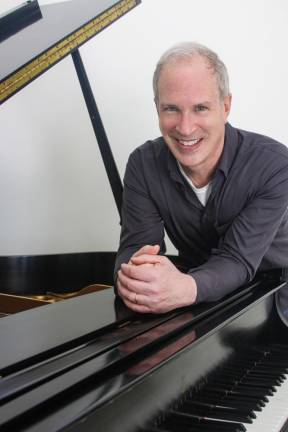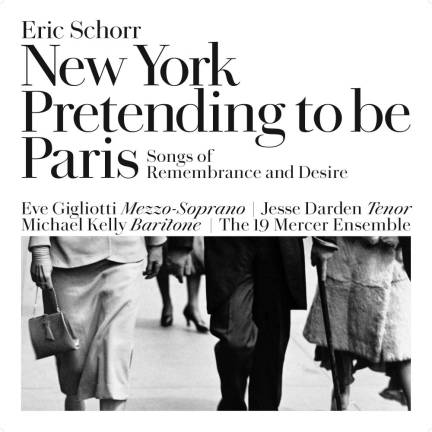Setting Poetry to ‘Mini-Musicals’
Composer Eric Schorr on his new album of art songs, “New York Pretending to be Paris”


Composer Eric Schorr is a musical chameleon. The Boston-born, New York based composer has written music for a variety of genres and venues, including the musical “Tokio Confidential” at Atlantic Stage 2, vocal arrangements for “Uncommon Women and Others” at Second Stage Theatre, and processional music for the Gay Games’ opening ceremony at Yankee Stadium.
Schorr’s music is distinctive for its eclecticism — jazz, bossa nova, and classical music are all in its DNA. Schorr recently released a new album called “New York Pretending to be Paris,” a collection of art songs about love featuring the poetry of Richie Hoffman, Cynthia Zarin, Morri Creech and others. We sat down with him to discuss his love of poetry, storytelling, and the best advice he’d give to a young composer.
First of all, I loved the album. It was beautiful. It was stunning. Thank you for composing such a beautiful album.
Well, it’s very nice of you to say that. I write, I guess, for myself, or at least originally. And then when it comes time to go into mode with musicians and instrumentalists and singers of course, they bring to it something special, especially if they’re talented, right? So it was a real privilege to work with all these people. And each person contributes something very unique and it’s a real collaborative process.
When you listen to a poem, how do you know that it’s right to be set to music?
I think it can be different things. Because I’m a musician, I respond to rhythm in the language, I respond to cadences of the sentences, I respond emotionally to the imagery and the situation. And each of these songs is dramatic. They tell dramatic stories, they describe a situation that has a lot of emotion in it and I respond to that.
I spent a lot of time reading poems. I spent so much time in the library and downtown at Poet’s House and at bookstores, and it’s like digging for gold. Because I was looking for something very specific and finding that kind of poem that will work musically, it just takes ...It’s like a needle in the haystack and when you find the gold, it’s like, “oh my gosh.” It’s such a revelation and it provided so much joy and I think it’s because you spend a lot of time looking and struggling and then you find this gem. And it’s really thrilling.
You’ve written for musical theater and art songs like the ones found on the album. What do you feel is the main difference between writing for a musical and writing a song cycle or album?
I think if you’re writing for musical theater, you have very specific moments that are dictated by plot and character. If you think about any musical, whether it’s “Guys and Dolls” or “Oklahoma,” or “Sweeney Todd,” in any good musical the characters are singing because they have something to say. Their emotions have gotten to the point where they really have to burst into song ... These poems are, in my mind, mini-musicals. They’re solo mini-musicals; they’re dramatic stories.
I treated these as little plays. And it was important to me that they thematically be linked ... And they do sort of flow into each other like a bunch of short stories, right? And while the characters might not be the same in each poem, I think because the poems are thematically linked, there’s a rhythm and a flow to how the stories unfold.
Why did you title the album “Pretending to be Paris”?
Well, I thought that the title was just so wonderful ... It’s so evocative and you think, “Well, what does this really mean?” And it obviously means something in the course of this particular song, the mother is sitting in an ersatz French bakery in New York where there’s a Pain Quotidien type place, probably more of a one-off, genuine French bakery in New York. But the image was so evocative to me.
And then, I guess because the word “pretending” is so loaded, and I think we all dissemble or pretend in some way, whether we’re in a relationship and we’re holding something back or pretending to feel one way or another. And I just thought because thematically, because all these songs have to do with memory and desire, pretending is a big part of that.
What’s the best piece of advice you could give to a young composer?
Well, I would say listen to as much music of all kinds as you can. Don’t limit yourself to any one genre. So if you think you want to be a traditional classical composer, or even an avant-garde one, you should still listen to pop and jazz and all that. Because I just think you’ll learn so much. It’s like looking at art, right? You might be a portrait painter, but I would say go out and look at abstract painting; it’s all art. You never know how your brain is going to get stimulated. So I think it’s very important as a musician and as a young musician to expose yourself to all different kinds of music.
And you have to find your own voice. I think as creative people, we all have our own voices inside of us and it’s unlocking that somehow, maybe it happens accidentally, or in my case, I think I always had this since I was a child. It was there and I had to tap into it. And don’t be afraid to screw up. Not everything you’re going to write is going to be successful and you have to be willing to embrace and learn from your mistakes and figure out why something wasn’t successful.